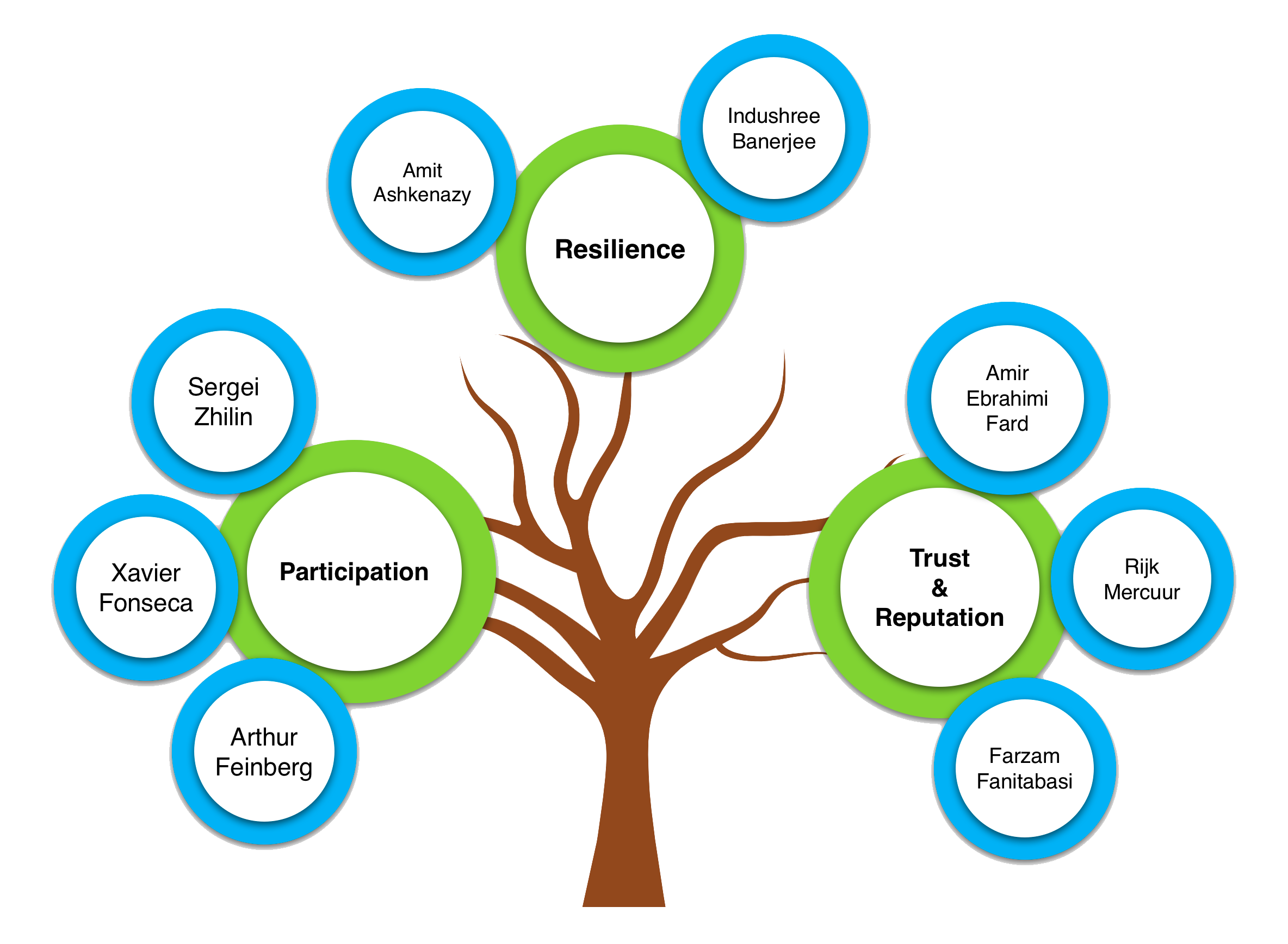Synopsis

Branch: Trust and Reputation
The focus area on Trust and Reputation comprises three activities: Rijk Mercuur investigates the important role that values and norms can play for the development of cooperation among humans in situations, where otherwise a “tragedy of the commons“ would result. Amir Ebrahimi Fard studies the spread of fake news and how it can be countered, for example by the use of suitable reputation mechanisms. Farzam Fanitabasi works out trustable communication mechanisms in a highly distributed communication network, which plays a role for so-called “ad hoc networks”.
Perspectives:
Values & Norms: The propagation of misinformation has become part of daily online communication such as twitter feeds, Internet chats and debates. By using social practice theory, we can gain insights into how and why this changes over time. For example, do Internet users behave in a responsible and considerate way or are they just driven by hedonism, power, and status? Moreover, can their behavior be positively influenced and, if yes, how?
Countering Rumors: The spread of misinformation in online social networks is a well-known phenomenon, which can lead to unpleasant consequences. In order to counter the propagation of misinformation, we study various strategies (such as the use of AI, reputation mechanisms or legal regulations). Once we know which strategy can contain misinformation on the Internet in which situation, we can design and implement effective policies.
Trustable Communication: The spread of misleading information in networks follows specific patterns and behaviors. By analyzing such patterns and behaviors on the propagation network, it is possible to detect, isolate, and mitigate the impact of misinformation. We study how to design and operate information flows such that communication is more trustable.
Branch: Resilience
The focus area on Resilience comprises two activities: Indushree Banerjee investigates energy-resilient networks, i.e. how to design adaptive, energy-efficient communication protocols that lead to robust, scalable and reliable information networks. Amit Ashkenazy studies participatory resilience, i.e. how new, bottom-up policy processes can be conceptualized, formalized, simulated and implemented to improve policies in complex settings.
Perspectives:
Energy Resilient Self-Organized Communication Networks: As the use of mobile phones skyrockets, designing mechanisms that allow the formation of ad-hoc networks during disruptive events becomes feasible. These mechanisms can also be beneficial in many developing countries, which lack infrastructure and have region-specific pockets of zero network connectivity.
Participatory Resilience: Recent advances in complexity theory and political science have led to the recognition that policy process theories and agent-based modelling can help us to understand political self-organization where self-conscious actors play a variety of roles. Modern tools such as agent-based simulations can support the modelling of heterogeneous preferences and non-linear interactions involved in policy processes.
Branch: Participation
The focus area on Trust and Participation comprises three activities: Arthur Feinberg analyzes peoples’ incentives to cooperate, the typical bonds between formal and informal networks, and the effects of local businesses on the ability of bottom-up initiatives to thrive. Sergei Zhilin works on open-sourcing urban design knowledge for community-driven urban transformation initiatives. Francisco Xavier Fonseca studies how games can be designed in such a way that they support meaningful social interactions.
Perspectives:
Facilitating Sustainable Cooperation in Urban Governance Systems: Cities are presently hosting more than half of Earth’s population, related with considerable carbon emissions and social issues such as inequality and polarization, but they are also motors of innovation. Most current scientific work focuses on smart cities and their technological and economic promises, but the social side is often neglected. Therefore, we study how to foster sustainable cooperation and, with this, bottom-up cooperation that can contribute to thriving cities.
Open Source Urbanism: Citizens interested in the democratization of urban development processes have been experimenting with the collection, improvement and sharing of urban design blueprints on the Internet with the help of open source tools and in the spirit of co-creation. Such attempts at opening up urban design processes, however, are still uncoordinated, atomized and dispersed. A concerted effort would create more value. Therefore, we focus on the design of a sociotechnical platform that can help to consolidate and strengthen this new movement.
Meaningful Social Interaction: Creating social inclusion – i.e. to give people a feeling of belonging, to help them value diversity and to confront xenophobia, racism, and violent extremism – is a challenge that today’s societies are often faced with. As collective activities are relevant for the promotion of social cohesion, this work focuses on how to promote social meaningful interaction with games. We do this in close collaboration with the cities of Rotterdam and The Hague.